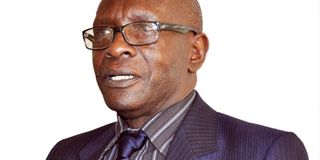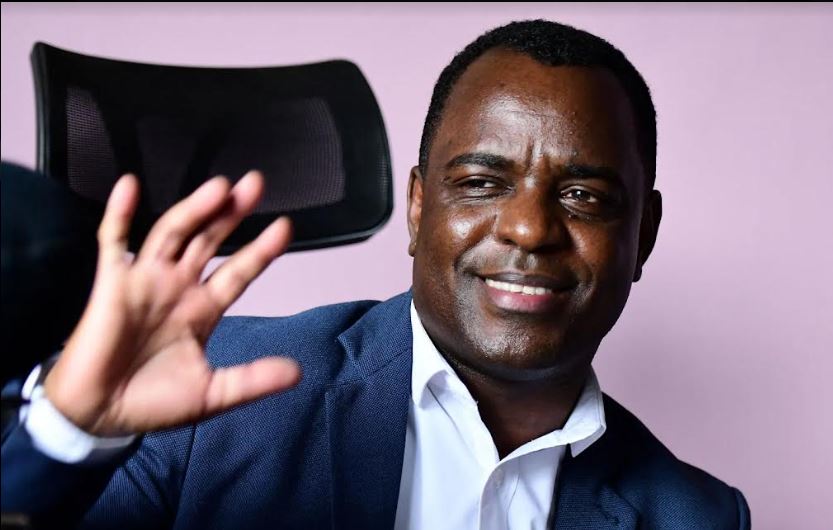CMI chief convinced me to return - Kyakabale

Lt Col Kyakabale during the interview. Photo by Risdel Kasasira
What you need to know:
Kyakabale speaks out on return
* Renegade soldier says he is at President’s mercy
* Denies being bribed with bags of money
* Says Dr Kizza Besigye was never in PRA
* Amazed by Kampala changes, flyovers
How does it feel returning home after 12 years in exile?
Coming back home from exile is the best thing to happen to anyone. I have been warmly welcomed and I’m very happy to see my children and other relatives. I receive visitors every day. There are so many changes in Kampala. I see roads with flyovers, which I didn’t leave here. There are so many changes. There is a lot of development in Kampala.
How was life in exile?
Life was not all that bad. In Sweden, government caters for every refugee who gets asylum. You are integrated into the community. Feeding and social life are not a problem. I was staying 500kms from Stockholm, northern Sweden in a town called Sundsvall. I was staying with my family. My children, who were born there, are now citizens in Sweden. My wife followed me there and we made a reunion.
Is your wife and children planning to join you here?
It will depend on their choice since they are Swedish.
How are your colleagues who are still in exile in Sweden?
They are ok.
Are they willing to come back?
I can’t read their mind. I don’t know whether they are coming or not.
How many are they?
I know Col Samson Mande, Capt Kabali, Dr [Wilbrod] Okungu and many others.
Were they all under People’s Redemption Army, the rebel group that you allegedly formed to overthrow President Museveni’s government?
Some went there before that Movement started. They reported to UNHCR and were relocated to a third country from Rwanda.
Who convinced you to come back home?
The process started way back in 2008 by Brig James Mugira. We used to talk on phone. He later sent me a team to meet me and the team came to my residence. But I doubted the team’s credibility. I told them I would first consult my friends and family and would let them know. That was the first contact. There was another effort by Brig Leopold Kyanda in 2009 but I had not made a decision to come. I was later contacted by Brig Charles Bakahumura and Brig Dr Musinguzi last year who convinced me to come back. I was with Brig Bakahumura in Gulu when he was a battalion commander in the 1990s and we knew each other. I didn’t doubt him. He convinced me when he said the President wanted me back home. I was convinced that Brig Bakahumura was genuinely carrying the President’s message. I had to accept and respect the call from the President.
What was the President’s message saying?
They said the President had sent them to contact me and that I would be welcomed back home. They also told me that the President said mistakes are made and can also be corrected. There have been reports that I was contacted by Opposition which is not true. I have also heard other people claiming they influenced my return. But this was entirely President Museveni’s effort.
Do you think you made a mistake before you fled?
I can’t say no or yes. In the military, there are issues you cannot reveal to the press. There are mistakes I made and there were mistakes made by the military. We all made mistakes.
What are those mistakes you made and those made by the military?
There were some rumours that I was undisciplined and at one time, I was arrested and detained in Makindye barracks for eight months on allegations that I had gone to Beni in DR Congo to steal gold. It was widely covered in the media. This allegation surprised me. I have never seen a gold store. The military could not verify this rumour but they moved and arrested me. On my part, on May 13 2001, I had malaria and I was somewhere in clinic in Kabale during parliamentary election campaigns and an NRM MP made allegations that I had shot bullets at rally in Muhanga. I wasn’t at that rally. The Chief of Military Intelligence sent a van full of soldiers to arrest me. He didn’t first investigate these rumours but they moved to arrest me. My driver was later arrested, beaten and he later died. Having received that information about my driver, I had to flee to Rwanda because I feared for my life.
But you feared for your life. Was that a mistake?
I should have remained and waited for investigations to be carried out and concluded. I would have explained to my commanders what happed rather than fleeing, or I would have waited to be arrested and face the law. I should have remained here.
Why did you choose to go to Rwanda?
I had many friends there whom we were together in the bush in Luweero and I had their contacts.
And after that, you declared rebellion against Uganda?
(Laughs) There were many stories in the media which were not true. But when you go to exile, you start thinking otherwise.
What do you mean thinking otherwise?
You react.
So PRA was a creation of the media?
No, there was something. But it was not well organised. It failed because it was not well organised. But it was there.
Who do you blame for poor organisation?
I blame the organisers
Who are they?
They are known. I don’t have to say them.
Would it be different if PRA was organised?
You can’t predict the success of the war.
Was Dr Kizza Besigye part of the organisers?
No. I didn’t see Dr Besigye. I just heard he was in exile in South Africa. I never saw him.
There were reports that Rwanda was supporting you
These were just speculations. When you are in exile, there will be many speculations. Mande and I were staying in different safe houses and didn’t even know what was happening where he was staying.
Did you deploy fighters in DR Congo like government has claimed to attack Uganda?
That’s speculation.
Under what circumstances did you leave Rwanda to go to Sweden?
On May 6, 2003, we left Rwanda for Sweden. There was some inter-country involvement in that issue and Rwanda agreed to hand us over to UNHCR and Sweden as the third country. Rwanda and Uganda agreed on our relocation.
How was it to begin a new life in Sweden?
We were received and distributed in different areas in Sweden. I was given a furnished residence. In Sweden, you are also given money for upkeep every month as refugee. I learnt Swedish to be fully integrated in society. When you learn the language, at Swedish For Everyone, you get a job.
What job did you?
I didn’t work. I was looking after my family, driving my children to school.
You had a car!
Yes. I had cars. I could buy and sell.
Where did you get money to buy cars?
You use that little money for upkeep sparingly and save part of it every month. At the end of the year, you can save money to enable you buy a car.
Do you think the conditions that forced you to go into exile have changed?
The administration of the military has changed. We had problems with some commanders. But some of them have been demobilised and others have joined Opposition. The conditions have changed for the better.
There are reports that you are coming back to campaign for the President in Kigezi sub-region
My return has nothing to do with elections. People can say that because I have come at a time when the country is preparing for elections.
There are reports that you were bribed by government to come back home?
I just came home willingly. I came to join my family. I have my children here. My coming back was purely based on the need to come and be with my children. I have five children who have graduated from different universities. My daughter is a pharmacist working with Internal Hospital Kampala. My son has a Masters’ Degree.
What did you discuss with the President when you met him last week?
We shook hands. He received me and welcomed me back home. He was very happy to see me back home after longtime in exile.
And you apologised?
I had to apologise for fleeing the country.
Does that mean you were feeling guilty?
Yes, because I fled the country when I was still a serving officer.
What do you plan?
The President has my future plans. He called me back home. I’m at his disposal. He is my mentor. He is the one who recruited me. He forgives. All what happened to me the president didn’t know.
Do you think the army is on the right track, especially in terms of promotion which has been sticky issue?
An officer is promoted on merit. Your promotion depends on your record. If you are undisciplined, you may have problems to get promoted.
Would you encourage those who are in exile to come back home?
I have been well received. I have been well looked after. I have not had any problem for the last two weeks I have been here. The situation at home has completely changed. I encourage them to come back home.
Besigye never in pra
The renegade Lt Col Anthony Kyakabale, who returned from exile in Sweden a fortnight ago, has spoken out for the first time on why he fled to exile and how the military intelligence has since 2008 been negotiating his return.
In an exclusive interview with Daily Monitor at the weekend, Lt Col Kyakabale revealed that it was the Chief of Military Intelligence, Brig Charles Bakahumura, with who he worked in the 1990s at the 4th Division in Gulu, met him in Sweden last year, and convinced him to come back home.
Lt Col Kyakabale, 63, also admitted People’s Redemption Army rebel group was formed to fight government but failed due to “poor organisation”. He dismissed allegations that the former Forum for Democratic Change President Dr Kizza Besigye was part of this defunct rebel outfit. Dr Besigye was arrested by government and charged with treason over his alleged links to PRA.
Col Kyakabale’s alleged accomplice, Col Samson Mande and several other UPDF deserters fled to Rwanda in 2003 but later relocated to Sweden following diplomatic spat with Uganda. He had also earlier been arrested and incarcerated in Makindye military cells for eight months over allegations that he had crossed to DR Congo to steal gold.
There is increasing focus by the government on the region from where former prime minister Amama Mbabazi hails from. It is expected Mbabazi, who fell out with his ally President Museveni, will soon declare his 2016 candidature.
Col Kyakabale, who was among the first 27 NRA fighters who attacked Kabamba on February 6, 1981, to mark the beginning of the five-year liberation war that brought President Museveni to power in 1986, is the second army officer to return from exile. The first was Gen David Sejusa who returned in December last year.
President Museveni has been in a reconciliatory mode. Last year, he cleared the return of the remains of former UNLA commander, Gen Bazilio Olara Okello. The army officer who had been buried in Sudan in the 1990s was reburied in Kitgum on February 15.



